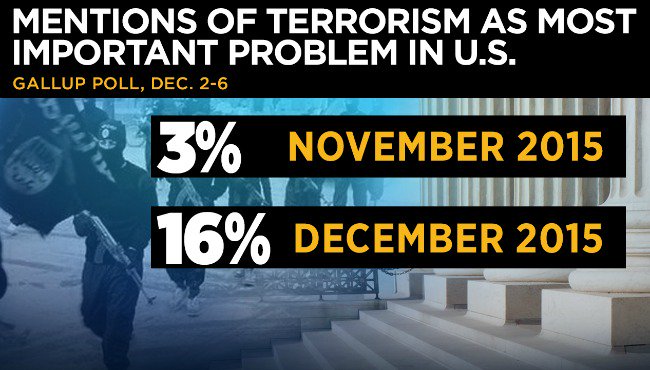 |
| Gallup poll results. |
Something happened, though, between then and now, more than ten years later. We've all seen so much violence perpetrated here, not just by terrorists. There have been more than our share of multiple killings, mostly at the hands of a gun. Indeed, there have also been other terrorist attacks, played out in other parts of the world.
Certainly, the attacks that occurred in Paris have struck a chord. Then there was the all-too-real attack that occurred at a Christmas party in San Bernardino, by a couple devoted to the Muslim religion. The male shooter had worked with many of the victims - fourteen died and 21 were injured - devastating the ranks of San Bernardino County workers, since most of the victims were social services workers from that county.
But somehow, since then, fear has taken over. It has shown the ugly side of Americans, the side that classifies and stereotypes people on the basis of appearance. While fear is understandable, especially since many people viewed clips of the violence, this time the fear has gotten hold of lawmakers, who are leading the fear-mongering. Ugly incidents of violence towards those who practice the Muslim faith have happened; mosques have been defaced and burned. Only two people who practice the Muslim faith, plus a neighbor who aided them, have been deemed responsible for the acts (the latter is accused and hasn't had a trial; the former died), yet many are vilifying all of those who practice the Muslim faith, even given the fact that all of those are innocent, bystanders like those Americans who weren't there.
Why did this palpable fear, with its expressed and demonstrated hate towards a group of people, get started - and keep going? What stoked these emotions? Even the fact that statistics such as the knowledge that more people are killed and injured in auto accidents per year than were killed in Paris and San Bernardino combined won't reduce the fear.
It is quite possible that seeing, experiencing the violent end results of these two attacks has actually resulted in PTSD symptoms in a wide population. Some of the sounds and sights that remind those individuals of the attacks can trigger flashbacks, then an automatic physical response. Human beings are prone to be on the alert after traumatic experiences because our bodies give us heightened sensations in order to protect us from dangers. But most often the responses triggered are just that, responses felt viscerally, without the presence of a real threat. That response then becomes dangerous to the individual reacting, creating a stress response that can lead to the development of chronic illnesses, both physical and psychiatric.
Then there is the group mentality and human beings striving to belong. The fact that the group has pointed towards people with a certain look from a certain faith background can lead - and has led - to lack of empathy and caring, a sense of blaming, even a misclassification of people, while holding them universally responsible for the source of our fear. There is even the misplaced sentiment of the group that deems it courageous to inflict physical pain and verbal vilification toward the so-called out-group, those that the group has identified as practicing the Muslim religion.
Just as there is a large group of people willing to classify those who practice the Muslim faith, there are others seeking for a way to stop this intolerance. But how is this done? The first step is observe the problem and recognize what it is. It isn't courage to attack others because you fear them. It is courage to defy a large group of intolerant individuals and help those of the Muslim faith, even at risk to ourselves.
That means following the guidance of a true leader, President Obama, when he said at the G20 summit, "The people who are fleeing Syria are the most harmed by terrorism, they are the most vulnerable as a consequence of civil war and strife. They are parents, they are children, they are orphans, and it is very important...that we do not close our hearts to these victims of such violence."
 |
| Stereotypical terms used for those who practice the Muslim religion. |
| Remember the positive ways to work together and offer help. |
Thanks to information from this article by the LA Times: http://www.latimes.com/local/lanow/la-me-ln-san-bernardino-shooting-live-updates-htmlstory.html; and this article from Greater Good: http://greatergood.berkeley.edu/article/item/how_fear_hurts_us.
No comments:
Post a Comment